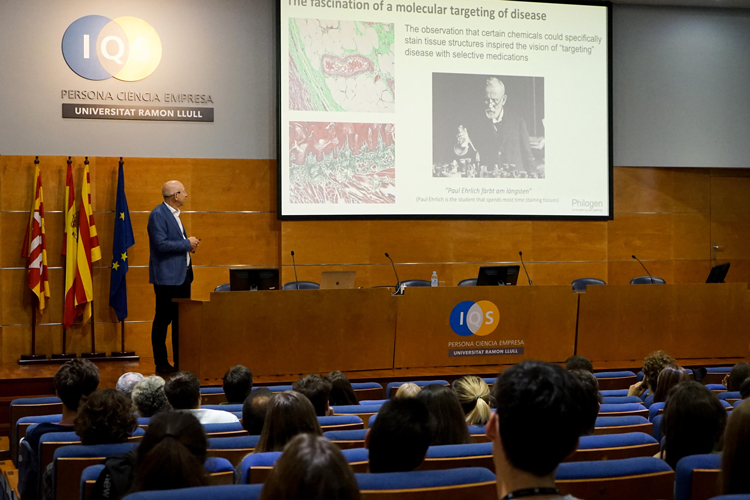IQS presented the first ever edition of ChemBioEng IQS Talks in academic year 2022-23. It involves a series of conferences held with internationally renowned researchers in the areas of Chemistry, Bioengineering, and Engineering.

IQS presented the first ever edition of ChemBioEng IQS Talks in academic year 2022-23. It involves a series of conferences led by researchers with international prestige and is aimed both at IQS research staff and students in advanced courses as well as researchers from other universities and research centres in the field. The event was created with the aim of strengthening the inseparable link between creating and sharing knowledge within higher education.
In addition, these conferences have two main objectives: to put researchers who have been invited to the event in contact with and enrich the IQS community; and to contribute to projecting IQS internationally as a benchmark research centre. The topics presented at the event were always related to the three fundamental areas at the IQS School of Engineering: Chemistry, Bioengineering, and Engineering, which are the departments that gave the name to the ChemBioEng IQS Talks conference series, which are complementary to those already organized by the departments, undergraduate and graduate programmes, and research groups.
First edition of the ChemBioEng IQS Talks
The inaugural edition was coordinated by IQS professors Dr Ana Belén Cuenca, professor and director of the Department of Organic and Pharmaceutical Chemistry, and Dr Benjamí Oller, professor with the Department of Bioengineering. The conference series will be held annually, and the second edition will take place during academic year 2023-2024, coordinated by Dr Cuenca and Dr Oller once again.
“It has been a pleasure to be able to contribute to starting this event that aims to reinforce the education and research at IQS from a new perspective,” says Dr Benjamí Oller. Dr Ana Belén Cuenca stated: “Having lectures with these characteristics is, without a doubt, a great opportunity to continue in our desire to make IQS a leading space for scientific exchange in higher education and the industrial environment that surrounds us.”
ChemBioEng IQS Talks 2022-23 Conferences
Each conference session began with a meeting for dialogue between the guest lecturer and professors who are interested in the subject. This was followed by the conference itself in the IQS auditorium, aimed at a wider audience. Afterwards, an informal meal was held with the guest lecturer and certain researchers and students.
Two sessions were offered for the first edition. The inauguration was led by Professor Dario Neri, from the Department of Chemistry and Applied Biosciences at ETH Zürich and co-founder of Philogen, an Italian-Swiss biotech company.
Dr Neri has received countless recognitions in the scientific world. He is an expert in targeted therapies for treating cancer and other angiogenesis-related disorders. He has pioneered the development of immunotherapies and the targeted evolution of small molecules through genetically encoded chemo libraries. The technologies that his laboratory has developed have enabled the creation of various products for clinical trials and the publication of more than 400 articles in scientific journals. In his lecture “From code combinatorial libraries to targeted therapies in the clinical stage,” he offered an overview of his lines of research, which are close to reaching the market.
The second day of the conference was led by Professor Johan Hofkens from the Department of Chemistry at KU University of Leuven in Belgium, who is also a member of the European Academy of Science. Dr Hofkens's research areas are focused on developing cutting-edge optical tools and techniques for nanoscale observation, such as single-molecule spectroscopy.
In his lecture “The Power of one: from single molecule investigations to materials research and beyond,” Dr Hofkens showed some of the applications of his research in topics relevant to the Society, such as the identification of bacteria in the microbiome through Optical Mapping, or the application of Optical Trapping technologies to study the behaviour of different materials with advanced microscopy techniques such as perovskites, which are very novel materials used in solar cells.
The conferences welcomed fantastic attendance, including numerous scientists from other institutions.
The ChemBioEng IQS Talks conference cycle has received external funding from the Catalan Territorial Section of the Royal Spanish Society of Chemistry, which we sincerely thank for their support.










